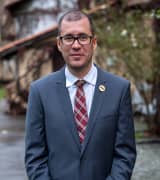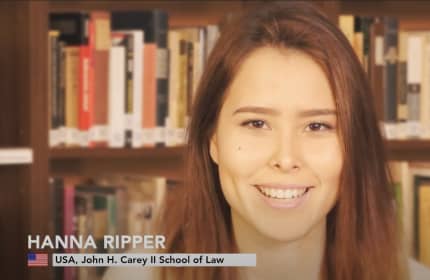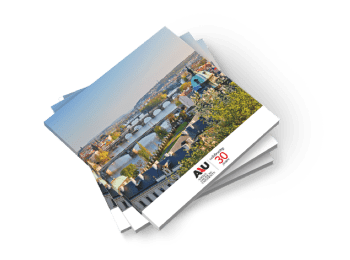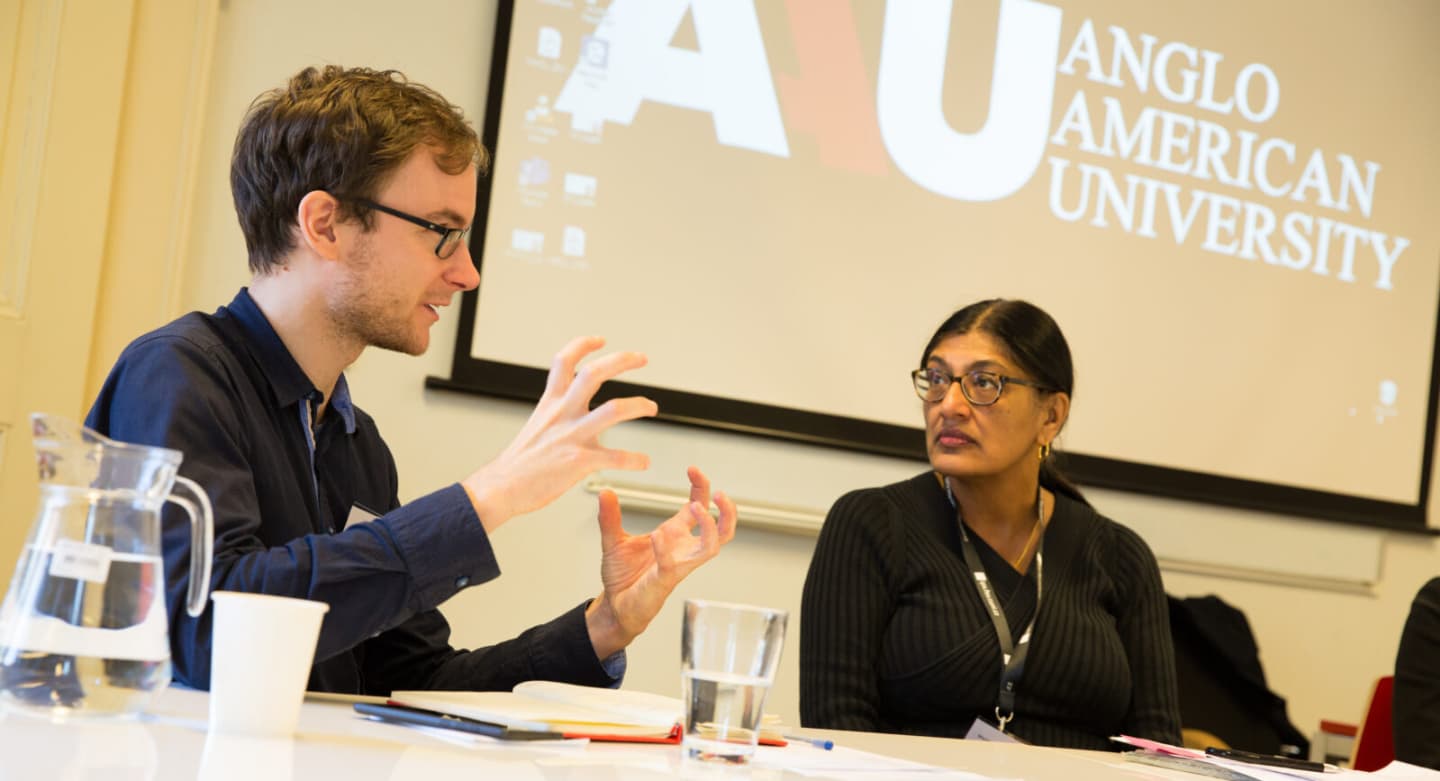
LLM in International Intellectual Property Law
This LLM programme enables students to study the specialised field of international intellectual property law in English here in Prague.

| Accreditation | UoL |
| Degree | LLM |
| Duration | 1 Year |
| Tuition | CZK 450,000 |
| Intake | Fall |
| Deadline | Rolling Admission |

Download Brochure
Please submit your details in order to receive the brochure via email.
We would like to inform you that we currently don’t accept applicants for the LLM in International Intellectual Property Law.
The Laws programmes are accredited in the United Kingdom, and therefore do not have Czech accreditation. This means that Law students are registered and study as Life-Long Learning students at AAU. As such, visa-seeking students should apply for a different type of visa and do not have student status in the Czech Republic. The coursework completed at AAU is utilized to assist students in developing their knowledge of the subject matter and preparing students to sit for the University of London examinations. UOL externally administers and grades all examinations. As such, AAU does not issue credits towards the UOL degree since all credits are awarded by UOL based on examinations and accredited in the United Kingdom.
About the Program
The University of London LLM programme, collectively referred to as Postgraduate Laws, is a full law Master’s degree programme that puts graduates on the path to becoming specialized lawyers or professionals. The University of London world-class LLM is of international standing. It has been the next step in the careers of thousands of practicing lawyers and professionals around the world.
The Postgraduate Laws programme is one of University of London’s Laws Programmes which are taught here in Prague, Czech Republic at Anglo-American University (AAU), a Recognized Teaching Centre of the University of London.

By taking supportive courses offered at AAU, students may also be eligible for additional or alternative specializations: Students on the International Intellectual Property Law track may be able to also achieve specializations such as International Business Law, Medicine, and the Law, Commercial and Corporate Law, or Computer and Communications Law.
What does Postgraduate Laws include and how is this different than the LLM?
The Postgraduate Laws programme is a nested programme that includes 3 levels:
- Postgraduate Certificate in Law
- Postgraduate Diploma in Law
- LLM
Therefore, the LLM is the highest level of the Postgraduate Laws programme. These three levels are nested, which means that they are each completed after a certain number of modules has been undertaken. All three levels are completed within the 16 modules needed to graduate with the LLM.
The Postgraduate Certificate is completed after 5 modules, the Postgraduate Diploma is completed after 10 modules total (including the previous 5 modules for the Certificate), and finally, the full LLM is completed after all 16 modules are passed (including the 10 modules required for the Diploma).
This means that students don’t spend any additional time or money completing all three – rather they build upon each other.
Students can earn up to 3 total specializations – one for each level. This allows students to leave the Postgraduate Laws programme, and thereby the LLM, with an impressive demonstration of their specific knowledge and education!

Your Degree & After
Studying the LLM with the University of London gives students the following:
- In-depth and specialized knowledge in a particular area of law, with degree specializations demonstrating their knowledge;
- Opportunity to engage in cutting edge research and legal projects, thereby putting them on the forefront of their chosen field;
- A dynamic Master’s degrees, that will enhance their career prospects and put them on the path for further studies, such as a doctoral degree;
- A full degree from the University of London
The Postgraduate Laws programmes provide you with many of the key attributes required by law firms – advanced, specialist legal training and the ability to work in a multinational legal environment. Graduates of the University of London Postgraduate Laws programmes regularly advance to high-level positions in a variety of sectors, including banking, financial services, financial regulation, human rights agencies, NGOs and public service.
Hanna Ripper, Law student, Student of the Year 2016“I’m studying UK law taught by professors who know my name and genuinely care about me, with students from Montenegro, Tunisia, South Africa, and so on. I’m working a legal internship with an AAU alumni that has given me incredible experience and unique opportunities. All this against the magical backdrop that is the City of a Hundred Spires. What more could I ask for?”
Many professional associations and Bar Councils also accept UOL Postgraduate Laws qualifications towards professional development quotas. For example, in England and Wales, the Solicitors’ Regulation Authority accredits our programmes (including individual modules taken on a standalone basis) towards Continuing Professional Development (CPD) hours.
Program Structure
The LLM in International Intellectual Property will be comprised of the following courses, which we believe will advance our students’ knowledge and career paths in this cutting edge field of law.
Following these courses you will find a list of optional courses that may be taught pending a minimum student enrollment.
Note: Each course is divided into a number of modules and each module will be taught over the course of two weekends.
Industrial and intellectual property
This course covers the fascinating area of Industrial and Intellectual Property. You will probably already have an understanding of what Intellectual Property or ‘IP’ is about; that it is a very significant economic asset of many businesses and therefore an understanding of the law related to this area can be very important in a commercial context. What you may be less aware of is that the law in this area is not just financially significant; it also throws up lots of interesting theoretical and ethical questions.
Intellectual property and medicine
The course will introduce you to the basic concepts of intellectual property relevant to medical research and development, pharmaceuticals and medical technology, genetic research and public health. You will gain an overview of key current issues, examine some of them in more detail through case studies, and in so doing develop skills and understanding which you can apply to monitor further developments in this fascinating area of the law. You will study the laws of various jurisdictions in the course. Much of the discussion focuses on English law, as shaped also by European Union (EU) legislation, but the aim here is more to illustrate broader legal principles than to give you expert knowledge of this particular jurisdiction, and we will also look at relevant international law and various other national laws.
Intellectual Property on the Internet
This important course investigates the relationship between intellectual property and the internet. What does intellectual property consist of on the internet? The internet has changed almost everything, and intellectual property law constitutes one of the most important aspects of its transformation. Old models are broken, no longer fitting how the world has changed and we’re not altogether sure with what to replace them. One of the key issues is whether we rewrite laws afresh or seek to modify traditional concepts to better meet the needs of our internet society. These key issues and their implications, along with the agencies that play significant roles in relation to ‘internet governance’ are explored in detail in this course.
Transfer of technology law
The exploitation of intellectual property rights is rarely confined to a single jurisdiction, but rather it crosses national borders. This interjurisdictional exploitation occurs most commonly with the innovation rights, that is: patents and trade secrets. However, issues arise in relation to other intellectual property rights as well. Thus, questions about the ownership of the key rights, the licensing of these rights and competition law must be answered. In Transfer of technology law you will study how and why the rules governing technology transfer work. The course examines the issues largely from the perspective of United Kingdom and European Union law.
Possible Alternative Courses
The University of London provides a diverse and robust curriculum, with a selection of interesting and important courses, therefore AAU may teach optional courses as well. However, they are not currently scheduled and their availability will be subject to minimum student enrollment. Nonetheless, please do let us know if you are interested in one of these courses:
- Franchising law
- Intellectual property and sport
- International and comparative law of copyright and related rights
- International and comparative law of patents, trade secrets and related rights
- International and comparative law of trade marks, designs and unfair competition
AAU also offers skill-based support courses for Law students such as Fundamentals of Legal Research Writing and Analysis, Legal English, Legal Research and Writing, Moot Court, Legal Skills Development, and Cross Cultural Negotiations and Dispute Resolution.
For more information on the modular structure and the study program, please contact our admissions team at admissions@aauni.edu.
Additional information
- Learn more about tuition and scholarships.
- Learn more about graduate admission requirements.
- Explore our FAQ section.
- Should you have any further questions please email us at admissions@aauni.edu
See what our students have to say
AAU offers the benefit of engaging with people and their cultures from around the world in the heart of one of the most beautiful cities in the world. In connection with the provided top tier education, you are offered a unique opportunity to start your career on an international level and make valued connections for your professional future.

Solicitor, Czech Republic
AAU’s Law school atmosphere is very friendly and tolerant. It allows you to study in an academic environment while having this family feeling around and you sort of feel at home.

John H. Carey II School of Law, Alumni
Meet the people


Carollann Braum, LL.M., J.D.
Program Chair, Mediator and Restorative Justice Facilitator carollann.braum@aauni.edu
Richard Akel, LL.B., LL.M., Dip. Trial Advocacy
Barrister in Residence richard.akel@aauni.eduDo you have questions?
We are happy to help!
Ask us a question!


